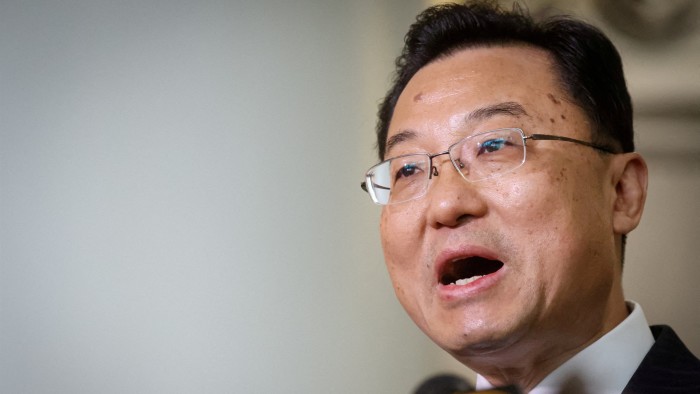China’s ambassador to the US has been scrambling to connect with potential Trump administration officials after several years of struggling to get meetings with Republicans in Washington.
Xie Feng has in recent months stepped up outreach in Washington by hosting dozens of former US officials and China experts at his home, according to people familiar with the situation.
The engagements have become more important following Donald Trump’s election victory because the Chinese embassy has had far more interaction with Democrats during Joe Biden’s presidency.
Evan Medeiros, a former top White House Asia official, said Trump’s victory caught China “flat footed”.
“They were scrambling around Washington and New York to find connections to Trump. They were asking Democratic analysts how to manage the Trump team,” said Medeiros, a Georgetown professor, who met Xie before the election.
“They essentially have one play: persuade business leaders around Trump to go soft on China.”
All ambassadors in Washington are trying to meet people who may join the new Trump administration. But Beijing faces a particular disadvantage because Republicans have been unwilling to engage Chinese officials in recent years as Washington has become far more hawkish on China.
Ann Kowalewski, a former House foreign affairs committee and Senate foreign relations committee staffer, said many on Capitol Hill were reluctant to meet Chinese officials because they felt the meetings would not be constructive. “There was a general belief that meetings would just be embassy officials reading talking points at them,” she said.
Earlier this year, Beijing tasked Cui Tiankai, its ambassador during Trump’s first administration, to reconnect with his former contacts in the former president’s team, but he was largely unsuccessful.
“Over the past few months, influential members of the Chinese Communist party visiting Washington indicated to me that they were having no luck getting appointments” with potential Trump officials, said Dennis Wilder, a former top CIA China expert.
In a bad omen for Beijing, Trump has nominated China hawks for top roles in his new administration, including Mike Waltz for national security adviser and Marco Rubio for secretary of state.
But Chinese officials are watching closely to see who Trump will name as Treasury secretary — and whether Robert Lighthizer, his former trade representative, will join the new administration. They are also paying attention to the role of Elon Musk, the world’s richest man, who has business interests in China and has joined Trump’s inner circle.
A Waltz spokesperson said he did not comment on meeting requests. A Rubio spokesperson did not respond to a question about whether the Chinese embassy had reached out. The embassy did not comment.
“They don’t appear to have the links to the Trump team they had last time,” said one person who has met Xie and his team. “The core question they were asking is: “what does Trump want?”
One former US official said China wanted “stability” and thought Trump wanted to do a deal with Beijing, but they did not know what the president-elect wanted and were “in a holding pattern” until negotiating channels emerged.
Christopher Johnson, a former top CIA China analyst, said Chinese officials were laser-focused on economic policy. “Their top three priorities are tariffs, tariffs, and tariffs,” said Johnson, who heads the consultancy China Strategies Group.
Johnson said there was debate in Beijing between less economic literate members of the politburo and technocrats over Trump’s threat to slap 60 per cent tariffs on imports from China.
“The former take the view that, ‘We beat them before and will do so again as we know how to eat bitterness and the spoiled Americans do not.’ The technocrats . . . realise that 60 per cent tariffs — or perhaps even smaller additional levies — could prove devastating for an already strained and deeply vulnerable economy,” he said.
One person in Beijing with connections to the Chinese Communist party said China wanted to do a deal with Trump, if possible.
“The challenge is we don’t know what Trump’s goal is [or] who can connect the two,” he said. “After the four years of the first term, I really don’t think people’s expectation in Beijing towards a deal is high.”
Another person familiar with the thinking in Beijing said it was “quite natural” for China to meet experts in Washington ahead of the new administration.
One person who has engaged with the Chinese embassy in Washington also pointed out that the fact Xie was trying hard to make connections did not mean that Beijing was in the dark about the incoming administration.
“Chinese intelligence is almost certainly tracking the coming and goings at Mar-a-Lago,” the person said, referring to Trump’s West Palm Beach club where he has been interviewing candidates for cabinet posts.
“Xie Feng is an experienced diplomat who knows that being Chinese ambassador is a lonely job in Washington, particularly in this environment,” said Myron Brilliant, a senior counsellor with DGA-Albright Stonebridge Group, a consultancy, who has known Xie for years. He added that it would be an “uphill battle” for the ambassador given the hawkish mood in Washington.
But he noted: “It’s important to note that Trump has an existing relationship with Xi and likely will emphasise his own rapport and channel with the Chinese president.”
Read the full article here




